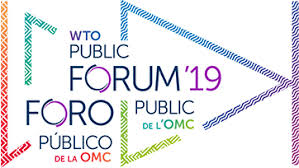Harnessing full potentials of data economy: ‘Osaka Track’ for international rule-making and the role of the WTO
11 Oct 2019 02:00h
Event report
[Read more session reports from WTO Public Forum 2019]
Mr Toshiro Iijima (Deputy Director-General/Deputy Assistant Minister, Economic Affairs Bureau, Ministry of Foreign Affairs of Japan) began by explaining the concept of the Osaka Track. He quoted Prime Minister Shinzō Abe of Japan during the World Economic Forum’s annual meeting in Davos, where he stated ‘I would like Osaka G20 to be long remembered as the summit that started worldwide data governance […] Let Osaka G20 set in train a new track for looking at data governance – call it the Osaka Track – under the roof of the WTO.’ According to Iijima, the key to this approach is ‘free data flows with trust’. The Osaka Track was placed under the roof of the World Trade Organization (WTO) because it is the forum where global e-commerce discussions have taken place. The G20 meeting in Osaka led to the adoption of the Osaka Declaration on the digital economy, which marked the launch of the Osaka Track as the new process for policy discussions on data governance. This demonstrated the G20’s commitment to promote international policy discussions on rulemaking in the digital economy. Iijima noted that WTO discussions on e-commerce are at the centre of the Osaka Track. The Osaka Track consists of three key elements: fostering a common understanding among negotiating members; making use of the expertise on data flow and on the digital economy from other international organisations; and, promoting holistic policy discussions on the digital economy. In addition to the WTO and other international organisations such as the Organisation of Economic Co-operation and Development (OECD), the private sector plays an important part in the discussions.
Mr Hosuk Lee-Makiyama (Director, European Centre for International Political Economy (ECIPE)) spoke about the importance of the digital economy in the global trading system. He acknowledged that a lot of trade has transitioned to the digital economy and that the digital economy in turn has enabled more trade. The digital economy has enhanced the tradeability of goods and services. Lee-Makiyama emphasised the importance of trust and noted that achieving data liberalisation that is in sync with trust will be increasingly important. A balance between the free flow of data and trust will enable co-operation, regardless of differing national legal standards or economic statuses. He also stated that the WTO is the natural home of the Osaka Track because of its centrality within the multilateral system. He highlighted non-discrimination, consumer protection, the facilitation of electronic transmissions, transparency, and the co-operation between members as important items in this context.
Ms Julia Nielson (Deputy Director, Trade and Agriculture Directorate, OECD) spoke about the OECD’s contributions in discussions around digital economy related to taxation and ‘going digital’. The OECD has brought together regulators to look at matters of privacy, cybersecurity, and risk management while also looking into the future of jobs. Trade has become more complex, and in addition to old problems, there are new issues such as data flows. She highlighted that data infrastructure and connectivity-related services have the largest barriers. The digital trade landscape contains a lot of uncertainty, which is why trade rules matter and why the role of the WTO remains essential. She also noted that there are deep philosophical and cultural reasons for why countries have differing approaches to privacy, but that areas of commonality can and should be found.
Mr Michikazu Chihara (Vice-Chair of Trade Policy Committee, Japan Electronics and Information Technology Industries Association (JEITA)) introduced some cases of digital solutions services that use cross-border data flows, including OneID (the facial recognition technology that is being installed at the Narita International Airport in Japan). Following the G20 meeting in Osaka and the Trans Pacific Partnership Agreement, the next step is to develop new rules for the digital economy, and in particular a comprehensive set of rules for e-commerce.
Related event

